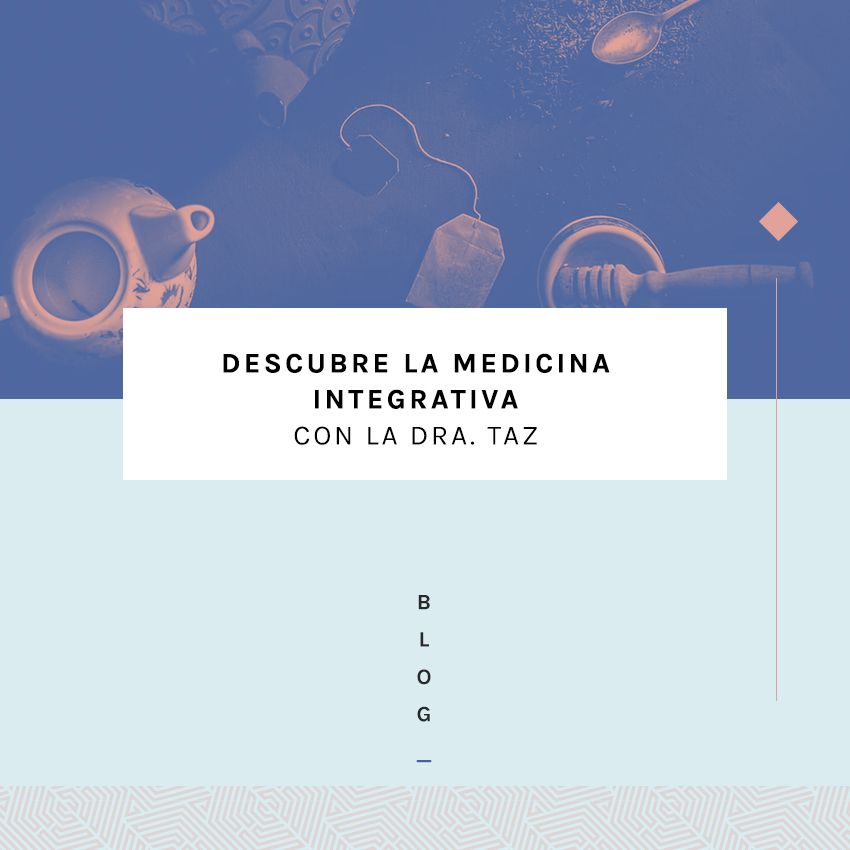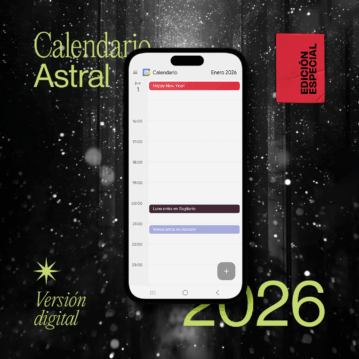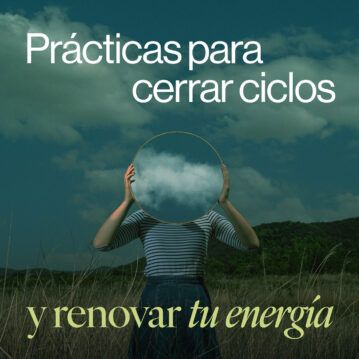
Descubre la medicina integrativa con la Dra. Taz Bathia
¿Te gustó este contenido? Haz clic en me gusta y consulta de nuevo, cuando quieras, en la sección de Mis Favoritos
La medicina integrativa tiene un enfoque particular: entiende la salud como la integración del bienestar físico, emocional y espiritual, atendiendo cada una de sus bases combinando tratamientos de las prácticas occidentales, pero también de otras escuelas de pensamiento como ayurveda y la medicina china.
Para contarles más al respecto, nadie mejor que la doctora Taz Bathia, experta en wellness, medicina holística, y salud femenina. Sobre estos temas ha escrito ya tres libros “What doctors eat” (Lo que comen los doctores), “The 21 day belly fix” (21 días para “arreglar” tu estómago) y el best seller “Super woman Rx” (Rayos x de una súper mujer), donde expresa su visión de que detrás del verdadero empoderamiento de la mujer está la atención a su salud y necesidades nutricionales, y justo de ello hablamos en esta entrevista.
Al final de la entrevista pueden disfrutar de su versión original en inglés:
¿Cómo definirías la “medicina integrativa” y cuáles son sus beneficios?
La medicina integrativa es la ciencia y el arte de combinar tratamientos convencionales con enfoques de otros sistemas de medicina y escuelas de pensamiento, por ejemplo, nutrición, medicina china, ayurveda y homeopatía. Los beneficios para el paciente son una gran caja de herramientas que puede usar para avanzar y depender menos de tratamientos, medicaciones y procedimientos costosos.
A nivel cultural, estamos acostumbrados a hablar de la medicina como una manera de arreglar un problema pre-existente- ¿Cómo se puede usar la medicina como una herramienta de empoderamiento o como una ayuda para vivir nuestra mejor versión? ¿Cómo podemos cambiar la conversación entorno a la medicina y nuestra comprensión de ella?
Creo que debemos continuar el regreso a nuestras raíces y expandir nuestra conversación sobre la conexión entre la química, la biología, las elecciones de vida, sea a través de más diálogos, casos de estudios o investigaciones. Este es un tópico muy importante, ¿cuántos matrimonios se acaban debido a la andropausia/menopausia masculina y femenina? ¿Cuántas personas no toman riesgos porque no se sienten bien?
¿Cuál crees que es la raíz más común de los problemas de salud en mujeres?
Creo que el estrés y una baja autoestima serían la raíz, seguida por problemas hormonales y del sistema digestivo. Las mujeres usualmente toman decisiones de salud y alimentación dependiendo de situaciones en las que están según su nivel de estrés y autoestima. El diálogo interno negativo y el “emotional eating” llevan a los excesos, a la adicción y más. Al mismo tiempo, mujeres fuertes pueden batallar con su salud porque no están conscientes de sus cambios hormonales o problemas digestivos, generalmente se toman como síntomas menores cuando pueden estar afectando toda su salud.
¿De qué manera el exceso de estrés de la vida moderna se manifiesta en las mujeres?
Desbalances hormonales, ansiedad, depresión, peso, son algunas de las muchas manifestaciones que el estrés tiene en la mujer moderna. En las mujeres más jóvenes vemos síndrome de ovarios poliquísticos, infertilidad, adicción y suicidio.
Sabemos que el mundo no va a bajar sus revoluciones y que nuestras rutinas se seguirán acelerando. Si bajar el paso no es una opción, ¿qué podemos hacer para mejorar nuestra salud y sentido de bienestar?
Creo que crear los límites que necesitas y un plan de bienestar basado en tu “Power type” (tipo de personalidad y sus necesidades) es esencial. Ésta es la herramienta óptima de empoderamiento, es un mapa que te permite mantenerte centrada y enfocada a medida que las situaciones de la vida cambian alrededor de ti.
Puedes conocer tu power type con el test personalizado que encontrarás en la página de Dr. Taz: clic aquí.
¿Cómo puede ayudarnos la regulación emocional a devolvernos nuestro balance físico y emocional?
El balance hormonal nos ayuda a manejar nuestro humor, energía, sueño y habilidad para enfocarnos. Una baja de progesterona, por ejemplo, puede ponernos irritables, erráticas y ansiosas. Una alza de estrógeno puede causar dolores de cabeza y depresión.
¿Cómo al sanar nuestro sistema digestivo podemos ayudarnos a recuperar nuestra energía e incluso nuestro enfoque?
Hay una conexión entre el sistema digestivo y el cerebro, y una conexión entre el intestino y las hormonas. Tener el balance ideal de bacterias en el intestino puede ayudar a balancear los neurotransmisores que te hacen sentir bien, como la dopamina, serotonina y la gaba. Comer alimentos que tienen un duro impacto en tu digestión pueden causar que te sientas nublada mentalmente o baja de energía. Por ejemplo, muchos pacientes que se benefician de una dieta libre de gluten, notan que se sienten peor cuando lo reintegran a su dieta.
Tu práctica médica te ha llevado a relacionar ciertos tipos de personalidad con ciertos síntomas. ¿Cuáles son estos tipos de personalidad y qué pueden decirnos sobre nuestro bienestar físico, emocional y mental?
Creo que los tipos de personalidad o “Power types” vienen de la medicina ayurvédica y china, por ejemplo:
- The boss lady (la jefa), es más de energía Pitta, lidera equipos, es ambiciosa, pero su sistema digestivo se ve afectado.
- The gypsy girl (la chica gitana) es más creativa, una soñadora, el tipo Vata en la medicina ayurvédica, con frecuencia está desconectada de su cuerpo.
- The Savvy chick (la que lo entiende todo), es la combinación de los dos anteriores , usualmente es una estratega visionaria. Por ejemplo: no solo sueña, sino que hace el trabajo para lograrlo.
- The earth mama (la madre tierra), ella nutre, es más del tipo Kapha en Ayurveda, cuida de otros, pero con frecuencia no se cuida a sí misma lo que genera problemas con la insulina y el peso.
- The nightingale (la ruiseñor) es una cuidadora enfocada en tareas o misiones, pero puede sufrir de enfermedades auto inmunes.
¿Cómo puede ayudarnos a entender nuestro cuerpo y sus necesidades el conocer nuestro “Power type”?
Al conocer tu Power type, que es la mezcla de personalidad, características emocionales y necesidades médicas y nutricionales, puedes sentirte realmente empoderada. Tu energía se eleva, tu mente se aclara y tienes un entendimiento de ti misma que te lleva a tomar las decisiones correctas.
¿Cuáles son algunas señales de alerta que pueden indicarnos que nuestro cuerpo y estilo de vida necesita ser “reiniciado”?
Creo que el dolor, la fatiga, la irritabilidad, la ansiedad, el aumento de peso sin explicación o la pérdida del mismo son algunos de los síntomas que nos alertan de que el cuerpo y la salud están necesitando balance.
¿Cuál es un hábito saludable que cualquiera puede integrar a su vida?
¡Dormir! Intenta dormir siete horas seguidas de 11:00 pm a 6:00 am, al menos cinco noches por semana y haz tiempo para “autocuidado”, unas dos o tres horas por semana.
English version
How would you define «integrative medicine» and what are it’s benefits?
Integrative medicine is the science and art of merging conventional treatments with approaches from other systems of medicine and schools of thoughts, i.e. nutrition, Chinese medicine, Ayurveda and homeopathy. The benefit for the patient is a bigger tool box that the patient can use moving forward and less of a dependence on costly medications and procedures.
Culture wise, we are used to talk about medicine as the fix to a pre-existing problem. How can we use medicine as an empowerment tool or as an aid to live our best life? How can we change the conversation around medicine and our understanding of it?
Medicine has been seen historically as a fix, but ancient systems of medicine understood the deep relationship between health, emotions and power- without your health- there really is no power. Fixing and understanding your chemistry is just not about changing numbers on a lab panel, but about shifting the way you think and feel and respond to your environment. When each of these are elevated to the highest level, then we know we are empowered and ready for our life’s purpose.
I think we need to continue to return to our roots and expand the conversation on the connection between chemistry, biology and life choices-whether it is more dialogue, case studies or research. This is a very important topic-how many marriages break due to male and female andropause/menopause? How many people dont take risks because they dont feel good?
What do you think are the must common roots of women health problems?
I think stress and poor self esteem are the root and then hormones and gut function second. Women often make food and health choices because of situations they are in due to their stress levels or self esteem. The negative self talk and the search for emotional eating lead to overeating, addiction and more.
At the same time, strong women can struggle with their health because they are not aware of hormone changes, or digestive issues. They often get dismissed as minor symptoms when they may be crashing their entire health.
In what way does the stress overload of modern day life manifest in women?
Hormone imbalances, anxiety, depression, and weight are just a few of the many manifestations of stress in the modern woman. In younger women, we are seeing PCOS, infertility and addiction/suicide.
We sure know the world won’t stop it’s pace. our routines just keep speeding up. If slowing down isn’t an option, what can we do to improve our health and sense of well being?
I think creating the boundaries you need and a wellness plan for you based on your Power Type is essential. That is why this is the ultimate empowerment tool, it is a roadmap to you so you can stay grounded and focused as life and life situations change around you.
How can hormonal regulation help us get back our physical and even emotional balance?
Hormone balance helps manage our moods, energy, sleep and ability to focus. Low progesterone, for example, can make us irritable, edgy, and anxious. High estrogen can cause headaches and depression.
How can healing our digestive system help us regain our energy and get rid of «mind fog»?
There is a gut-brain connection, and a gut hormone connection. Having the right balance of bacteria in the gut can help balance the neurotransmitters that make you feel good, like dopamine, serotonin and gaba. Eating foods that are hard on your gut can cause brain fog or low energy. For example, many patients benefit from being gluten free and notice that if gluten gets back in the diet they feel so much worse.
Your work practice has led you to relate certain personality traits with certain symptoms. What are this personality types and what can they tell us about our physical, emotional and mental health?
I think the personality types or Power Types come from Ayurvedic and Chinese medicine, for example:
The Boss Lady is more Pitta – leads teams, ambitious, but can affect her digestive system.
The Gypsy Girl is more creative – more of the dreamer – vata in Ayurvedic medicine, but often disconnected from her body.
Savvy Chick-is a combination of both and often a strategic visionary – i.e. can dream and can get the job done.
Earth Mama is more of the nurture- kapha in Ayurveda- but often does not take care of herself leading to insulin and weight issues.
The Nightingale is very giving and mission-oriented, but can suffer from immune dysfunction.
How can understanding our «power type» help us understand our body and it’s needs?
By linking your Power Type, which is a merge of personality, emotional traits and medical/nutritional needs, you can truly be and feel empowered! Energy soars, your mind clears and you have a knowing or understanding of yourself to lead you to the right decisions.
What are some red flags that could highlight our body and lifestyle is in need of a reset?
I think pain, fatigue, irritability, anxiety, unexplained weight gain or weight loss are just a few of the symptoms that can be red flags that your body and your health are in need of a balance.
What is a healthy habit anyone can integrate to their life?
Sleep! Try to sleep at least 7 hours straight from 11- 6 at least 5 nights per week and make time for self care – 2-3 hours per week






